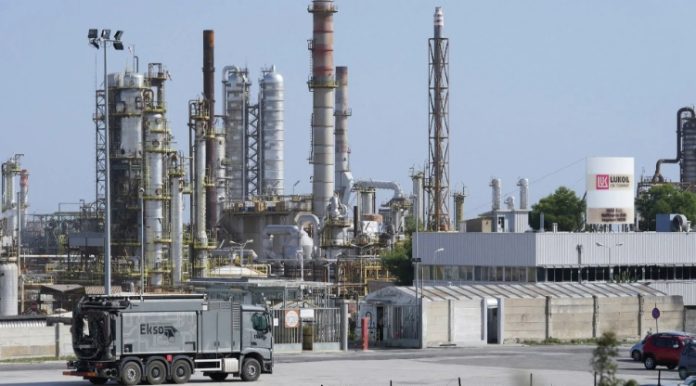Representatives of PJSC Lukoil said they were considering selling the largest oil refinery in South-Eastern Europe and other assets in Bulgaria.
Earlier this year, Bulgarian lawmakers approved a proposal to phase out Russian oil imports, bringing the country in line with other European Union members. This month, the ruling coalition unveiled plans to end imports in March, prompting Neftochim, Lukoil’s refinery on the Black Sea coast, to start looking for alternative fuel sources.
Russia’s second-largest oil company is now reviewing its strategy in the wake of “discriminatory laws and other unfair, biased political decisions regarding refineries,” the producer said in a statement on Tuesday.
The Sofia government had already terminated Lukoil’s lease of the refinery port in July, and antitrust authorities earlier this year fined the company’s Bulgarian subsidiaries a total of 263 million leva ($146 million) for abusing its dominant position.
Lukoil, which bought the former state-owned Neftochim in 1999 and has since invested more than $3.4 billion, is the main supplier of fuel to retailers in Bulgaria. The company also owns a transit oil pipeline that runs through most of the country. Bulgaria is not subject to European Union rules banning Russian oil imports as a sanction. The exemption, originally valid until the end of 2024, was already reduced by three months in September.
The new rules, which Bulgaria’s parliament could approve as early as this week, include halting all imports from March and cutting exports of some refined products. If the amendments to the law, which Bulgaria says are a way to end potential circumvention of EU sanctions, are passed, refineries could be forced to shut down, jeopardising fuel supplies, Lukoil said last month.
Lukoil said on Tuesday it would work with international consultants to review its strategy for its Bulgarian assets, analysing various options including selling the business. The assets include 220 petrol stations and nine oil depots, as well as ship and aircraft bunkering businesses, it said in a statement.
Bulgarian Finance Minister Assen Vasilev rejected accusations of discrimination, telling reporters that the government needed to ensure that the refinery remained intact, possibly with the involvement of a strategic investor.
